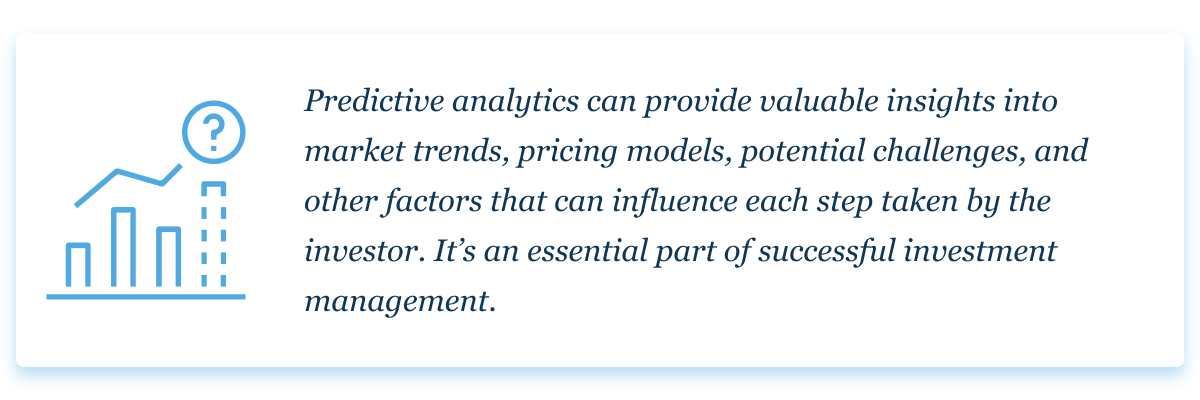We all wonder where to locate our money in times of economic downturn. Using AI for investment management could be one of the most reasonable decisions. Why? Because investing is recommended as an effective method of preserving the worth of people’s savings when inflation and prices increase.
Thanks to artificial intelligence, it becomes much easier to start and handle all the operations that were once available only to Wall Street experts. Today everyone can invest and AI can be their partner in these efforts.
Still, many aspiring investors wonder if AI-based tools are safe to use and how they actually work. This article is dedicated to exploring all of these matters. Investing with the help of artificial intelligence is full of opportunities, but it should be done with caution. Let’s start with the basics to progress towards more details and actual solutions that might be helpful when using AI for investment management.
What is investment management?
Investment management is the process of selecting and managing investment portfolios. It can be done through qualified advisors or on one’s own. It’s probably the most important aspect of financial planning and wealth creation. The process includes many activities. Here are the main operations that are usually performed:
- assessing expected returns from different investment options,
- selecting the ones with the highest predicted profit,
- monitoring funds against expectations to ensure their performance,
- allocating and reallocating assets to adjust the strategy according to economic conditions and investing preferences.
If the investor chooses to collaborate with an investment manager, they need to find a person they can trust, with appropriate experience, skills, and knowledge.
Some experts only advise their clients, while others manage their portfolios and are directly responsible for picking the actual investments included in them. Investors that decide to manage everything on their own can use various tools that will support their actions. Many of them use some kind of AI model to help with data analysis and ensure accuracy. We’ll discuss them in the further part of this article.
Why investment management should rely on AI?
To understand better why AI can be useful when investing money, we need to consider all the factors that influence the way investors make decisions and achieve success. Besides the activities mentioned above, a person that wants to safely allocate their money and get returns has to be highly observant, analytical, as well as aware of rapidly changing market conditions and potential risks. Investment strategies shouldn’t be coincidental – everything has to be calculated and adjusted to the investor’s tolerance for possible losses or stagnancy.
All that requires one particular skill, which is data analysis. Artificial intelligence is exceptional when it comes to processing vast amounts of data and producing conclusions that are helpful for informed decision-making.
From market research to detecting potential risks, AI eliminates human error and can quickly find patterns that would be missed by even the best advisor. Additionally, a well-constructed AI-based investment tool can collect data from various sources, which is crucial to have a detailed overview of the broad financial landscape.

Source: Unsplash
Artificial intelligence can also integrate with the user’s investment framework to make the whole process more straightforward. Instead of moving data from one place to another, AI can become an all-in-one investing assistant that will support the user when managing their portfolio, buying new assets, or withdrawing returns.
The right AI model would also be able to teach their user about the investment basics and give them useful tips, which would make the financial world more open and safe for everyone. In times of economic hardship, it’s crucial to educate people about money and support them in making better decisions to keep and grow their wealth.
How AI can be utilized for investment management?
AI is used in a variety of business areas, including AI marketing solutions, E-commerce, automotive, and the service industry. We’ve already mentioned some examples of its applications for investment management. Now, we should explore them further. The main goal here is to help investors make better decisions and optimize their asset portfolios.
Here’s how using artificial intelligence for investing makes a difference in that field:
Predictive analytics
AI is an ally when it comes to the analysis of large amounts of data. That’s why it’s often utilized to identify patterns and forecast potential increases and decreases – no matter if it’s for a single type of asset or for the market as a whole.

Determining risks
Based on historical data, AI can find out if a specific investment is worth taking a particular risk. Why risk-related knowledge is so important in this area of finances? Because risk is always involved when investing money. Its levels can vary depending on the assets, market conditions, and other variables, but there’s no single way of investing that doesn’t have even the smallest potential to be risky.
AI can find out how much risk a person can tolerate. Then, it analyzes collected information and indicates which assets match their profile. It raises awareness and supports investors in allocating their money to sources that could be safer for their wallets.

Source: Unsplash
Sentiment analysis
It’s a separate area of analytics dedicated to browsing through social media, news articles, and all the information sources that might impact the way financial instruments behave. Did you ever hear that one tweet changed a dynamic of a stock exchange? Or that a single event in one part of the world disrupted the prices of assets worldwide?
Thanks to AI, many of these incidents can be predicted or at least quickly detected. Reaction time and careful decision-making are essential to lower the potential losses. Also, sentiment analysis is crucial on a day-to-day basis when the investor decides which assets to buy or sell.
Advanced portfolio management
There are many things that AI can do better and faster than humans. This opens new opportunities to make investments easier, more accessible, more profitable, and safer for all market players. For example, artificial intelligence tools can do relationship mapping to identify connections between market indicators that are not obvious at the first sight. Such information can help investors build better, more diverse portfolios that meet their requirements.

Source: Unsplash
Another great example is an analysis of niche data sources. Before it was impossible to be aware of every single thing that might be important for investment decisions. Now, thanks to the internet and the interoperability of digital solutions, AI can even take weather forecasts or keywords from search engines into consideration when trying to predict what will happen on the market. Thanks to all this data, the investing world becomes open to everybody, even if they don’t have advanced financial knowledge.
Algorithms used in AI-powered investment management
Since artificial intelligence comes in many shapes and forms, we ought to mention various algorithms and methods utilized for investment management services. Let’s jump right in and see how AI can elevate every aspect of financial operations:
Machine learning for managing investments
ML algorithms can be harnessed to do numerous things. They are also appreciated by investors and asset managers. According to BlackRock’s paper from 2019, machine learning was already successfully used to improve all areas of financial advisors’ work – from user experience to operational efficiency to the investing process itself.
Since then, the eulogies towards machine learning in that department don’t stop. In their article about the subject, Forbes underlined many advantages, including better access, decreased bias in decision-making, higher returns, and detecting more investing opportunities in accordance with specific criteria. But how can machine learning algorithms do it all?

Source: Unsplash
There are several types of machine learning that work on different datasets, which makes this particular algorithm so universal and multi-functional. The three types that are used are:
- Supervised learning, which involves labeled datasets to train the algorithm. This AI model is used for classification (categorization of assets, e.g. spam detection) and regression (detecting relations between dependent and independent factors, e.g. revenue predictions). When it comes to investment management, it can forecast upcoming market fluctuations and predict the performance of single assets or groups.
- Unsupervised learning that analyzes unlabeled datasets to detect hidden patterns. The subsets of this ML type are clustering (grouping assets based on similarities or differences, e.g. market segmentation), association (finding correlations between assets, e.g. for recommendation systems), and dimensionality reduction (useful for improving the quality of images). Within the investing world, it can help to find assets with similar characteristics or detect anomalies within market data.
- Reinforced learning, where the researchers assign which behaviors are desired and which are not to teach the algorithm how it should behave. This model is goal-oriented and can learn via trial and error (e.g. with each try it becomes better at winning a video game). This model can be used to create investment strategies that are more risk-proof and offer better rewards.

Source: Unsplash
Machine learning is usually a starting point for any other algorithm that becomes a part of an investment tool or system because of its versatility. It can be used for portfolio optimization, risk assessment, forecasting, and so much more.
Investing management with natural language processing (NLP)
NLP, which is a subfield of AI that focuses on the interaction between computers and human language, is another great tool for investors. Its main purpose in that field is to analyze vast amounts of textual data from numerous sources such as articles, reports, and social media. Gaining insight into investor sentiment, corporate performance, and market trends is the main advantage of incorporating this subset of AI for investment management.

According to Primer: “Asset managers now find it harder to uncover new investment opportunities amidst a challenging landscape.” With the amount of information that overflows us every day, it’s hard to find value and make decisions based on true indicators of success.
However, thanks to NLP they can be aware of emerging trends, detect meaningful patterns, and prevent risky behaviors. This way, their strategies and decisions become more informed and have a higher chance to provide profits to investors. Moreover, they can shorten the reaction time which is crucial in today’s fast-paced world.

Source: Unsplash
Deloitte conducted research on natural language processing and natural language generation (NLP/G) to conclude that it can be a great methodology to verify initial investment ideas, evaluate past decisions, optimize the investment management process, and generate reports.
Additionally, NLP algorithms can support people in mundane, repetitive tasks like extracting key entities from datasets (e.g. company names, industry terms, key representatives, etc.), finding similar data sources that match particular themes, and identifying events (such as mergers, acquisitions, and announcements) that could provide new market opportunities.
Algorithmic trading
Using algorithms to perform trading operations is not a new phenomenon. Nowadays, 60-70% of all stock market transactions are done by computers and predictions show that the CAGR for the algorithmic market might get to 10.5% between 2023 and 2028. It proves that machines are great allies for investors that want to maximize their profits and get better when it comes to managing their financial decisions.

Source: Unsplash
What’s important about algorithmic trading is that it doesn’t only help investors get impressive results, but it can also predict how their decisions can impact the markets. It’s an essential advantage for hedge funds and corporate investors because their expensive trades can disrupt stock exchanges for quite some time. With the help of AI, they can find the right moment to make a transaction that won’t have such a negative impact.
Algorithmic trading can lower investment risks, but its main benefit is decision-making that doesn’t involve human emotions. As the Entrepreneur.com article notices, people experience a wide range of emotional reactions that can have tremendous consequences when it comes to their investment choices and overall performance.
They provide the example of the 2008 global crisis where the first signs of market collapse were noticeable, but people were fixated on the bull market and its benefits. It can go the other way around – if the investor experiences a significant loss, they can make irrational decisions that won’t help them get back on track, but actually the opposite. The algorithm, on the other hand, always follows the guidelines and doesn’t react impulsively.
Such AI-based investing models use various algorithms, including ML, deep learning, and a plethora of tools developed to help investors use the full potential of machines when allocating their assets.

Source: Unsplash
Robo-advisors
Robo-advisors are digital platforms or apps that take all the advantages of artificial intelligence to help their users manage their investment activities and control their portfolios. AI software for investment management usually greets a customer with a questionnaire that is used to determine their risk tolerance and investment goals. Then, the algorithms analyze the answers to recommend assets to buy.
A system dedicated to investment management is somewhat a combination of all mentioned above models. They utilize AI algorithms to allocate assets, rebalance the portfolio, showcase market trends, and support the user while making the next steps in their financial journey. Some robo-advisors are made with beginners in mind to help them start investing. Usually, they have intuitive, easy-to-navigate interfaces and educational features. Other platforms are more advanced with sophisticated charts, multiple trading options, and various functionalities.
The main benefit of a robo-advisor is that they typically offer significantly lower fees than traditional, real-life financial advisors. Thanks to the technology they utilize, many aspects of trading are automated, which decreases operational costs. In addition, apps and platforms are accessible 24/7, which means the user can always check their account balance, add more assets, and do other activities that would have to wait if they collaborated with an investment manager. They also eliminate the emotional decision-making mentioned in the algorithmic trading section.

Source: Unsplash
Some of the top robo-advisors recommended online include Wealthfront and Betterment. It’s important to remember though that every tool has to be used with caution. To pick the right one, the investor should always compare fees and offered services to choose the platform that matches their needs and requirements. Also, investors with complex financial situations or unique investment goals would probably benefit more from working with a financial advisor that will be able to comprehend their nuanced situation. For ordinary users, the rule of thumb is simple – they should never invest money they can’t afford to lose.
Challenges of using AI for investment
AI for investment management have the potential to bring significant benefits, but there are also challenges that have to be considered. The first one is data bias. Algorithms rely on large amounts of data, but if the information fed to them is biased, their decisions and predictions will be as well. For example, algorithms trained with historical data might provide results that reflect systemic problems, such as gender and race discrimination.
Another issue that should be addressed is over-reliance on algorithms. It can be problematic, especially for less experienced investors. AI is not infallible even if it proves its reliability when it comes to identifying patterns and making predictions. Market conditions can change rapidly, and they are usually influenced by many factors that are not always obvious. If people rely too much on algorithms, they can get a false sense of security which ultimately will result in poor investment choices.

Source: Unsplash
The complexity of AI-based investing systems can make them problematic when it comes to law regulations. Ethical concerns like the use of personal data or the AI’s impact on job markets have to be addressed, and it’s not easy when some brands don’t offer full transparency. Since investment management takes care of two very important and sensitive assets – private information and money – security should be the highest priority. It has to be guaranteed by the providers, but also by governments and other regulatory entities.
It’s also worth remembering that the technological landscape is constantly evolving, which means the challenges within the AI-based investment management industry will be changing over time. As algorithms become more advanced and widespread, it will be important for all involved players to stay up-to-date and adjust their strategies accordingly.
Final thoughts
In conclusion, AI became yet another revolutionizing factor for investment management. Even though algorithms and computers were utilized by this sector for quite some time, the power of artificial intelligence boosted their presence and leveled it up to help financial advisors and their clients get even more out of their market moves. We’ve mentioned several methods used to create robust strategies, make well-informed decisions, and avoid potential risks, but with the technological growth probably more are yet to come.
We’re quite certain that in the future AI will continue to play an increasingly important role in investment management. The world’s fascination with the concept, as well as its wide adoption among companies and individuals, means that investing will become more accessible and even amateurs will have a chance to allocate their money to get high returns.
Our predictions say that investing will become cheaper and its efficiency will definitely grow. Probably robo-advisors and apps dedicated to investment management will play a significant role in that process. What’s crucial here is to help people understand better what investing is all about and give them the tools to do it the right way.
Artificial intelligence at your company – today.
Looking for machine learning consulting and development or any other AI-related services? We’re here to help. Our brand offers business advice and a dedicated team with a problem-solving attitude. Contact us and let’s discuss our collaboration.



